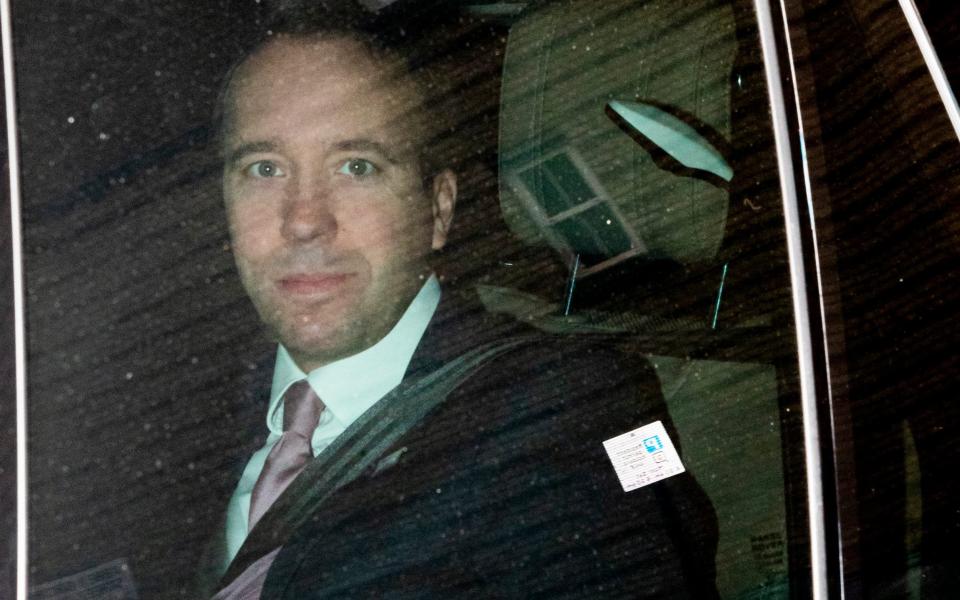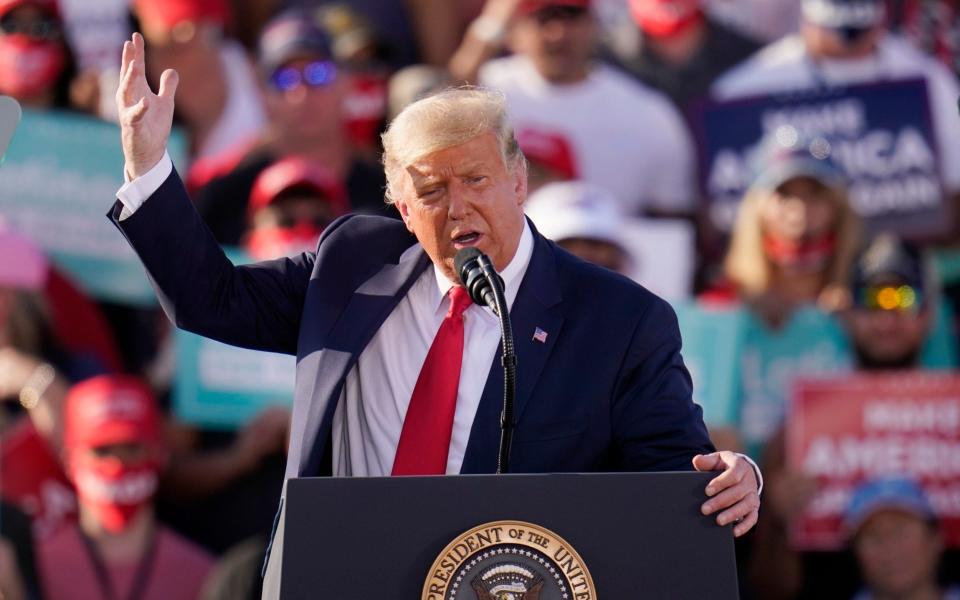Tuesday morning news briefing: Manchester's shielding plea to Boris Johnson

If you want to receive twice-daily briefings like this by email, sign up to the Front Page newsletter here. For two-minute audio updates, try The Briefing - on podcasts, smart speakers and WhatsApp.
Shielding is the answer for Manchester, Johnson told
Manchester MPs and city leaders have urged Boris Johnson to introduce shielding for the elderly and vulnerable in the region instead of bringing in new lockdown restrictions. The Prime Minister is expected to announce today that Greater Manchester will be placed into the highest tier of Covid measures, with or without the consent of its leaders. Late last night, Robert Jenrick, the Communities Secretary, said local leaders have until noon to reach an agreement on restrictions or be forced to comply with a Tier 3 lockdown. It comes after senior Tory MPs backed a move by the leader of Manchester City Council to shield those most at risk, claiming that would cost only a fifth as much as a Tier 3 lockdown while allowing businesses to stay open. Downing Street was also accused by an expert of massaging statistics to justify putting Manchester in the tightest restrictions. Our coronavirus liveblog will keep you up to date.
Meanwhile, Downing Street has been forced to remind ministers to wear face masks after the Health Secretary was caught travelling in a chauffeur-driven car without one. Matt Hancock, who has been a keen advocate of face coverings, was spotted without a mask while travelling in a ministerial car to the Department of Health and Social Care on Monday. No 10 has since reminded ministers that they must wear masks when travelling as passengers in cars. Read on for more. Here is a reminder of the latest social distancing rules and exemptions.
GCHQ blocked employment of non-white applicants
British intelligence services "blocked" the employment of non-white applicants until the 1980s, an authorised history of GCHQ has found. History professor John Ferris was commissioned to write the first official history of the agency as part of its efforts to open up more to the public in its centenary year. The book says that, by adhering to the Foreign Office's "four British grandparents" rule for applicants, designed to enhance security, GCHQ effectively "blocked admission to non-white applicants" until around 1980. Dominic Nicholls also reveals how the book suggests there were tensions between the British and American signals intelligence organisations around the time of the Falklands War.
Diana note denying BBC dirty tricks goes missing
A handwritten note by Diana, Princess of Wales, exonerating the BBC over murky claims surrounding forged documents and exploitation might be expected to be kept tightly under lock and key. But as new allegations emerge about exactly how Martin Bashir managed to secure that bombshell Panorama interview 25 years ago, mystery surrounds one piece of evidence that should alleviate both the presenter and the corporation. Victoria Ward outlines the claims of the new Channel 4 documentary - and the conundrum of the critical note. Meanwhile, Diana's son, the Duke of Cambridge, has expressed fears of a "mental health catastrophe" if the entertainment sector collapses due to Covid-19.
At a glance: More coronavirus headlines
Ireland lockdown | Six-week shutdown with tough restrictions
Like flu | Vaccine 'unlikely to eradicate Covid', says Vallance
Lockdown loophole | Working lunches in the pub could be exempt
'It's crackers' | Life in the village divided into two coronavirus tiers
Empty car park | Portal sends people to testing site that does not exist
Also in the news: Today's other headlines
Open justice | High-profile parole hearings of criminals' bids to be released from jail should be held in open court, the head of the parole board has said as reforms to lift secrecy are announced today. In an interview with The Telegraph, chief executive Martin Jones said parole hearings of offenders like black cab rapist John Worboys and Helen McCourt's killer Ian Simms, who refused to reveal the whereabouts of her body, should be opened to the public. Read on for details.
'Cynical and reckless' | Russian spies tried to hack Tokyo Olympics
Smart motorway crash | Widow says Highways England responsible
Bugs on the battlefield | Army unveils small drone in tech revolution
Take a dip | Cold water swimming 'may help protect from dementia'
Last night's TV | David Walliams presents mix of triumph and tragedy
Around the world: Muted microphones for next debate

Donald Trump and Joe Biden will have their microphones turned off at Thursday's presidential debate to stop them talking over each other. The Commission on Presidential Debates has announced that it will use a mute button to enforce two minutes of uninterrupted speaking time for each candidate per topic after the first debate between the rivals became a farce. Mr Trump's campaign has objected to the change but said the US president would still take part. His team is also unhappy at the choice of topics. Read on for details and click here for more pictures of the day.
Donald Trump at a rally in Arizona on Monday. CREDIT: AP
Comment and analysis
William Hague | Depriving the young the great outdoors is a tragedy
Chris Green | Why won't Whitehall explain its Covid strategy?
Celia Walden | Cancel culture wants to censor our imaginations
Maria Lally | Hippocrates was right about benefits of wild swimming
Reader letters | Don't lump rural and urban areas into one lockdown
Editor's choice: Features and arts
Life on hold | Why I'm freezing my eggs in my 20s - and think other women should too
It takes two | The secrets behind the world's most successful duos
The show must go on | How to still see panto this Christmas
Business and money briefing
China cleans up from Covid | British officials paid up to £320m of taxpayer money to Chinese state-backed companies amid a scramble to secure medical supplies at the height of the coronavirus crisis. Health authorities agreed almost a dozen deals with firms linked to the Communist regime in Beijing as they raced to buy ventilators and PPE after Covid hit, according to Telegraph analysis. Read on for details.
'Reliefs too complex' | Why millions are paying over the odds in tax
Investment tip | It may be time to take a bite of Greggs
Alex cartoon | See our cartoonist's latest work on world of finance
Sport briefing
Champions League expansion | Uefa are ready to consider radical plans to increase the size of the Champions League to 36 clubs from 2024-25. The proposal would see each side play 10 group matches and it is understood to be gaining support among clubs from across the European game, including some of its biggest leagues. Details here.
Leeds 0-1 Wolves | Raul Jimenez scores deflected goal
Heung-min Son | Tottenham prioritise new contract for forward
Premiership final | Further doubts for Wasps after more positive tests
Tonight's dessert
Meyer lemon pudding cake | An old-time dessert with dual textures and tangy brightness. Meyer lemons have a wonderful balance of sweet and sour. Read the recipe.
And finally... for this morning's downtime
The rise of the hotel office | As the stresses of working from the bedroom sparked an argument with her husband, Lucy Denyer did what any enraged spouse might do after a particularly explosive row – she checked into a hotel. With the pandemic having a dramatic effect on tourism, she reveals how the hospitality industry is targeting people that don't enjoy working from home.

